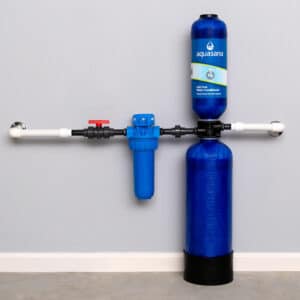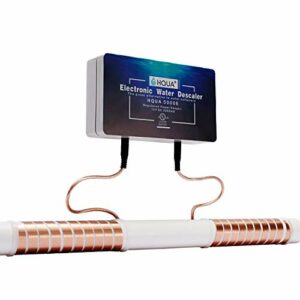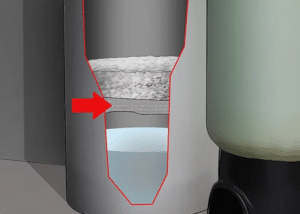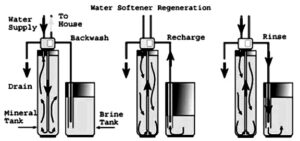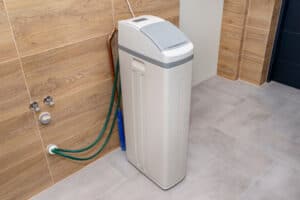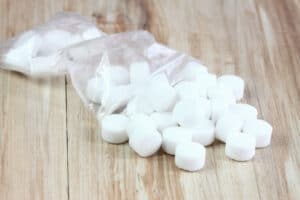The best whole house water filter is a necessity in many parts of the country.
Why?
Safe and clean drinking water is vital to the health of you and your family and a quality whole house water filter will remove harmful contaminants. Not only does this make the tap water safe for consumption, but it also improves the taste.
This type of water filtration system actually connects to your home’s main water line – so that all of your water outlets (sinks, showers, laundry, etc.) provide filtered water.
Here’s what you need to know to buy the best whole house water filtration system.
Whole House Filters Comparison Table
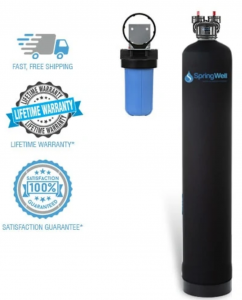
- Filter Stages: 4
- Dimensions: 9 x 48
- Weight: 45 lbs
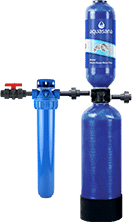
- Filter Stages: 3
- Dimensions: 9 x 46 x 44
- Weight: 56.2 lbs
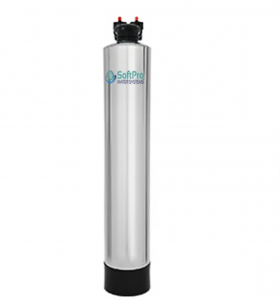
- Filter Stages: 3
- Dimensions: 9 x 48 x 25
- Weight: 32 lbs
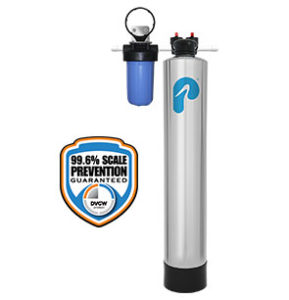
- Filter Stages: 3
- Dimensions: 18 x 18 x 49.5
- Weight: 45 lbs
Criteria For Choosing a Whole House Water Filter
Because everyone’s needs and preferences are different, it’s important to understand the factors and features that influence your whole house system’s filtration quality and performance.
Here’s what you need to look for to find a quality whole house water system:
Evaluate Your Needs:
Not every home or family requires the same type of water filtration system.
Spending a few minutes evaluating your needs greatly helps narrow down your options for whole house water filters.
At the top of the list is the size of your home. The number of bathrooms, in particular, will dictate the size/output of filter. Larger homes typically require more powerful systems.
Similarly, the size of your family dictates the type of filter. Larger families also require more powerful systems.
At the same time, a larger family likely uses more water. It’s beneficial to invest in a filter with a longer lifespan between replacements/maintenance to accommodate more people.
Finally, your home water habits are important to consider. Once again, those that use more water should look for a filtration system that meets these particular needs.
Identify Main Contaminants:
Some models filter out all contaminants while others only filter out specific contaminants.
Because of this, it’s essential to understand which contaminants are in your home’s water supply.
If possible, test your home water supply before buying a filtration system. This gives you a clear understanding of the specific contaminants your home water supply contains.
Some filters are best for sediments while others are best for chemicals and others are best for bacteria/viruses – many filter out all three and then some.
Further Reading:
- Best Water Filters For Removing Lead
- Best Water Filters For Removing Iron
- Best Water Filter For Removing Fluoride
- Best Sulfur Water Filter
Types of Whole House Water Filters:
Whole house water filters can be broken down into sub-types by one major factor: number of filters.
Although single-stage systems are available, most whole house systems utilize two-stage or three-stage filtration systems.
Single-stage systems are more affordable. They are also typically easier to install. The downside is they filter out a smaller range of contaminants.
For example, single-stage systems use a single filter. This filter is often designed for one type of contaminant, such as sediment.
Two-stage and three-stage systems, on the other hand, use multiple filters. Each of these can be designed for a specific type of contaminant.
That taken into consideration, three-stage systems are undoubtedly the most efficient and produce the cleanest water.
However, depending on your home water quality (get it tested!), a three-stage filter might be overkill.
Important Features to Consider:
There are several other important factors to consider in addition to whole house water filter type and the main contaminants.
The most important additional features include:
- Filter Type – Different filters block different contaminants. Select one that blocks the contaminants in your home water supply.
- Filter Longevity – Most filters have either a 100,000-gallon rating or 1,000,000-gallon rating. This dictates how often you’ll need to change the filter.
- Water Flow – Most whole house filters produce between 10 gallons and 20 gallons of water flow per minute. Larger homes need a higher output while smaller homes can get away on less.
- Microns – This relates to the size of the contaminants. The best filters block down to 1 micron or smaller. Your water quality test will tell you the size of the particles in your home.
- Installation – Some whole house water filters are much easier to install than others.
These factors will all help you find the right device for your needs and preferences.
Alternative Options:
A whole house water filter is only the tip of the iceberg as far as water filtration goes.
Although they are very effective, especially for those that want to filter all the water in their home (not just drinking water), they are expensive.
Small families, those with smaller homes, those on a budget, and those just concerned about clean drinking water (not clean toilet water or shower water, for example) might look into alternative options like under sink filters or even reverse osmosis.
The Best Whole House Water Filters
- SpringWell Water Filter System
- AquaOx Water Filters
- Aquasana Rhino
- QWT SoftPro Carbon Filter
- Pentair Pelican Water Filter System
- iSpring WGB32B
- Home Master HMF3SDGFEC
- 3M Aqua-Pure
- Home Master HMF2SMGCC
1. SpringWell CF1 – Best Whole House Water Filter System

According to customers , they saw immediate improvement in their water quality after installing this system. The efficiency and excellent customer support makes Springwell the preferred choice.
In our opinion, the best whole house water filter is the SpringWell CF1 system. Using high-quality catalytic coconut shell carbon and certified KDF media, the SpringWell Water Filter is a 1,000,000-gallon system that proves the optimal solution for removing contaminants from city municipal water. The ActiveFlo filtration system features a four-stage design that allows the most contact time with any water system on the market, while giving you multiple lines of defense to best filter and purify your water.
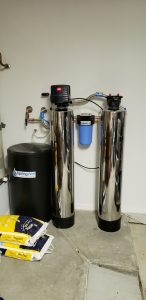
The first stage, the five- micron sediment pre-filtration removes sand, clay, and other sediments. Then the KDF bed utilizes a copper/zinc alloy media to remove chlorine and heavy metals. The coconut shell carbon bed removes organic contaminants, and the flex bed eliminates channeling with more contact time. This system will remove around 99.6 percent of the contaminants, such as chlorine and sulfur, that make water taste and smell bad while maintaining your water pressure.
If you are familiar with plumbing, you may be able to install this system. SpringWell provides a detailed installation guide and video to show you the process. However, you may need to hire a plumber to install this system for you. The good news is that once it’s installed, you should never need to replace it. Depending on your bathroom units, you will enjoy between 9 and 17 GPM.
We think this is at the top of the list of the best whole house water filtration systems.
Read our full review: SpringWell Whole House Filter System
- Filters up to 1,000,000 gallons of water while maintaining water pressure
- Eliminates bacteria, chemicals, and heavy steels
- Allows the most contact time with any system on the market
- Low maintenance
- Includes a six-month refund warranty
- You may need to hire a plumber to install this system.
- Does not include a replacement filter.
2. AquaOx Home Water Filtration System – Another Excellent Choice

Next up, we have the AquaOx whole house system. They are a US company and their products are also made in the USA with high quality materials and components.
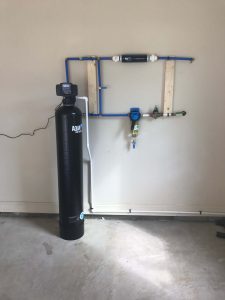
This whole house system effectively removes the following elements and other contaminates: Chloramine, Chlorine, Hydrogen Sulfide (rotten egg smell), Iron, Lead, Mercury, Trichloroethylene (TCE), Tetrachloroethylene, Trihalomethanes (TTHMs), and Volatile Organic Compounds (VOCs).
The system features a 70-micron stainless steel pre-sediment filter. It also leverages two double vortex plates for backwash efficiency. It is programmed on every third day at midnight to do a backwash through the ½” pipe on the back of the unit to your drain. Another pipe in for your city or well water and a final out pipe for purified water to go to your home (or business). That’s it, an elegant and simple design that is on the easy end of the scale for installation
Top Benefits: Easy, low-maintenance design, no replacement filters required, Abundance of KDF 85 Premium Media (No one else on the market uses this. They use KDF 55, which is a lower grade media), Higher grade Centaur catalytic granular activated carbon (industry standard is coconut shell carbon)
We have only recently started investigating the AquaOx system, but we are quite impressed. Make sure you take a close look at it as it easily places near the top of our best whole house water filtration systems.
Special Discount: We’ve negotiated for Water Filter Spot readers a special coupon code (waterfilterspot) to use at checkout to save a whopping $500 off this system.
- Prevents bacteria from growing in the tank
- Removes chemicals, contaminants and heavy metals
- No Replacement filters
- Filter lasts for upwards of 20 years
- Excellent Personalized Customer Service
- Durable construction and fittings
- You may need to hire a plumber to install this system.
3. Aquasana Rhino – Whole house filter & Softener Combo

If you’re looking for a whole house water filter and softener combo, you’re unlikely to find any better than Aquasana Rhino. Aquasana is a leading name in the water filtration industry – and their whole house water filter exceeds the high standard set by the company.
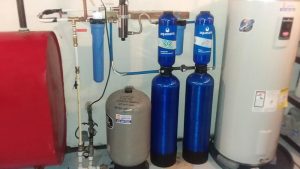
Although it’s available in a number of models (including a more affordable 5-year model), our review is focused on the 10-year model with water softener, UV filtration, and professional installation kit.
What this means is that the filter lasts for up to 10 years. It’s capable of filtering 1,000,000 gallons of water for your entire house, that’s a lot of capacity.
The system removes 97% of chlorine, 99.99% of bacteria, and other major contaminants from your home water supply. The addition of the water softener filter helps protect your home’s pipes and plumbing fixtures from damage.
A major benefit of this filter unit is the dual tank design for more efficient filtration. The double tanks also prevent clogs and other problems.
Although their products, including this one, are top-notch, Aquasana has a reputation for lackluster customer service – which is a potentially big negative if you have a problem with this whole house filtration system.
This is, after all, a list of the best whole house water filtration systems and we know our readers’ expectations are high. So, we strive to be balanced in our approach and not just mention all of the positives of these water filtration systems.
- Excellent water quality
- Filter good for 10 years
- Durable construction and fittings
- So-so customer service
Conclusion
The Aquasana 10-Year Whole House Water Filter comes with everything you need for clean, drinking water in a small, easy-to-install package. The catch is potentially difficult customer service.
4. Quality Water Treatment SoftPro Carbon Filter – Best Budget Filter

QWT features the SoftPro NaturalSoft Whole House Upflow Carbon Filter, which utilizes catalytic carbon to remove common tap water contaminants from up to 600,000 to 1,000,000 gallons of water! This low-maintenance system produces no wastewater and uses no electricity, making it an eco-friendly choice.
The SoftPro Whole House Upflow Carbon Filter comes in either a basic or elite model. Both models employ catalytic carbon to remove chlorine, chloramine, pesticides, herbicides, TTHMs, and VOCs; however, the elite model also removes fluoride, petroleum, and pharmaceutical byproducts and comes with a KDF 55 Sponge to remove bacteria and heavy metals.
This upflow system allows the media to have more contact time with the water, producing better quality. Both models are available for either a 1-3 bathroom home or a 4-6 bathroom home.
The SoftPro Carbon Filter is quite affordable, plus the company is usually offering sales. In addition, the company offers a money-back guarantee and a lifetime warranty on this filter.
While this company offers excellent customer service, some information is either vague or not included online, such as contaminant reduction rates, filter replacement details, GPM rates, installation information, and the filter’s dimensions. However, QWT continuously encourages its customers to contact them via phone or email if they have questions or concerns about their products.
Since 1990, Quality Water Treatment, a family-owned business in California, has designed and manufactured high-quality water filtration and softening systems at affordable prices, and with excellent customer service.
We like this system and company quite a bit, so it was an easy choice to place on our best whole house water filter list.
Read our full review: Quality Water Treatment SoftPro Whole House Upflow Carbon Filter
- Removes common city water contaminants
- High filtration capacity at 600,000-1,000,000 gallons
- Environmentally friendly
- Affordable price and excellent warranties
- Leak-proof
- Superb customer service and support
- No online installation manual offered on website
5. Pentair Pelican Premium Whole House Water Filter System
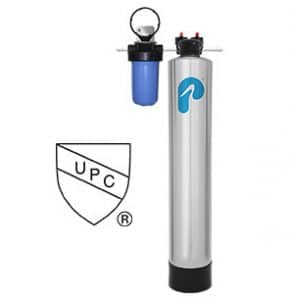
Attached to your main water line, a whole house water filter system cleans and purifies all the water flowing through your home while removing all harmful contaminants.
A leader in the water filtration market, Pentair Pelican, features the Premium Water System which uses state-of-the-art technology to remove roughly 97 percent of chlorine and other contaminants in up to 1.301 million gallons while also inhibiting bacterial growth.
Because this unique system utilizes an up-flow design (opposed to the typical “down-flow designs that many filtration systems use), it does not require electricity or produce water waste during its filtration process.
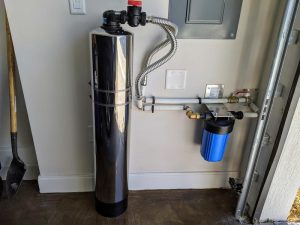
NSF/ANSI 42/61 certified, the four-stage filtration process includes the 5-micron Sediment Filter that removes sediment and debris down to 5 microns and the Catalytic Granular Activated Carbon Media (GAC), which employs a quality blend of catalytic coconut shell based activated carbon to removes chlorine, chloramines, pesticides, herbicides, pharmaceuticals, industrial solvents and other contaminants.
The patented Pelican Media Guard – Copper and Zinc Oxidation Media (KDF-55), then removes bacteriostatic copper and zinc in order to prevent and reduce bacteria and algae growth.
Pelican’s filter is available in two models, the PC600 (1-3 bathrooms) and PC1000 (4-6 bathrooms), which differ slightly on flow rate (8-12 GPM/12-16 GPM), but both recommend an operating pressure and temperature of 25-80 PSI and 36-120 F. All the parts necessary for a complete installation are included, and this system can be installed inside or outside.
The Sediment Filter needs replacement every 6-9 months, while the Tank Media only needs replacing every five years or 650,855 gallons (PC600)/1,301,1700 gallons (PC1000). Pelican also offers a 90-day money-back guarantee, a five-year performance guarantee, and a limited lifetime warranty.
The Pelican system is another choice for best whole house water filter and deserves a good look.
Read out full review: Pelican Premium Whole House Water Filter System
- Efficient four-stage filtration process
- Tested and certified to NSF/ANSI standards 42 and 61
- No electricity required/no water waste
- Minimal maintenance
- Impressive guarantees/warranties
- May need to hire a professional to install
- No indicator on sediment filter when it needs replacing
6. iSpring WGB32B 3-Stage Whole House Water Filtration System
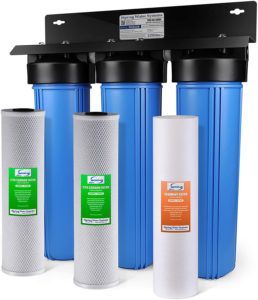
This whole house water filter from iSpring is highly regarded for its featured packed design and stellar performance.
It’s based on a three-stage filtration system to more effectively remove contaminants (including chlorine, pesticides, solvents, sediment, and more) from your home’s water.
Like all whole house water filters, this model hooks up to your home’s main water line to supply your entire home with clean, safe drinking water. Despite its superior filtering ability, this device only removes the bad stuff from your water. It leaves healthy minerals in the water system. There’s a minimal impact on water flow and water pressure.
The three-stage filtration system utilizes a polypropylene sediment filter and CTO Carbon Block filters to efficiently filter, on average, up to a one-year supply of water for a family of four before changing the filters.
The only downside is the filtration system’s bulk – it’s a big device. Make sure you have room for it before purchasing. DIY installation can also be time-consuming, so most users hire a professional.
This iSpring system is a worthwhile addition to our best whole house water filter lineup. But, realize that it is more of a budget choice and not as an overall capable solution as the other water filtration systems higher on our list.
- Three-stage filtration (chlorine, heavy metals, heavy sediment and dirt)
- Filter keeps healthy minerals in water for the household and the filtered water also tastes good
- Long-lasting stage filters
- Difficult to install without professional help
Conclusion
The iSpring WGB32B 3-Stage is an efficient, effective, and low-maintenance whole house water filter for those with larger homes.
7. Home Master HMF3SDGFEC Whole House 3-Stage Water Filter
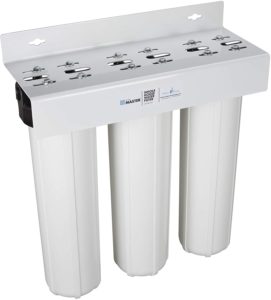
This whole house water filter from Home Master is a burly device with over sized filters.
It utilizes a three-stage filter, including replaceable carbon fiber filters, to provide clean drinking water for a family of four for up to one whole year before replacement.
The device filters down to 1 micron, effectively removing 95% of contaminants to improve safety and increase taste in your home’s water.
Like all whole house water filters, it connects directly to your home’s water supply so that every tap or outlet in your home pumps out safe, clean water for many months before maintenance is required.
The key difference between this water filtration system and other of the best whole house water filter systems is the large fittings. The 1-inch ports in the filter allow for higher water flow and water pressure than seen in almost any other device in this class.
Although there are very few negatives to this Home Master filter, one that did stick out is the inclusion of some plastic fittings. Not only are these prone to damage, but they also have a higher potential for leaking.
We have another solid contender on our best whole house water filter list here and, like the iSpring above, more of a budget choice compared to our top selections.
- Excellent build quality
- Three-stage filtration to remove 95% of contaminants (metals, chlorine, bacteria, lead, herbicides, pesticides and other chemicals)
- Strong water pressure
- Plastic fittings can leak
Conclusion
Quality is everything when it comes to this Home Master three-stage water filter. It’s built from the ground up with performance and durability in mind. It’s perfect for anyone looking for a simple, straightforward whole house filter with an all but indestructible design.
8. 3M Aqua-Pure Whole House Water Filtration System
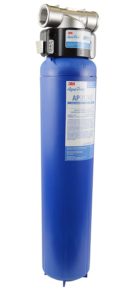
This 3M Aqua-Pure water filter is a simple, scaled-down take on a whole house filtration system.
Although it performs much the same task as the other whole house filters on this list, it does so in a much smaller (and far easier to install package).
It’s important to note, however, that this is a single-filter device. It does not incorporate a 3-stage filter system like many other whole house systems.
Despite the single filter, the 3M Aqua-Pure Whole House System is still highly effective at removing contaminants from your water, particularly chlorine.
The company itself recommends pairing this water filter with a pre-filter system that enables it to catch more dirt, dust, and sediment for even cleaner, healthier drinking water.
One major benefit of this particular whole house water filtration system is the massive flow rate. It provides almost 20 gallons of water per minute.
Finally, as you can tell from the single-stage water filtration systems involved here, this is another budget choice. It is worthy of our list of the best whole house water filters, but more suited to those with lower expectations and requirements.
- Great value
- Easy installation
- High flow rate
- Only good for particulate matter
Conclusion
Those looking for a simple, straightforward, easy-to-install solution to whole house water quality should look into this filtration system from 3M Aqua-Pure.
9. Home Master HMF2SMGCC Whole House 2-Stage Water Filter
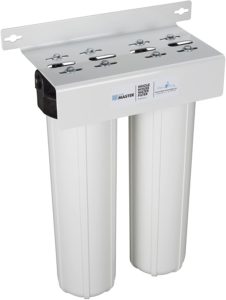
Another top-notch whole house water filter from Home Master, the HMF2SMGCC utilizes a two-stage rather than a three-stage filter.
It’s two-stage filtration system is capable of filtering water from 25 microns to 1 micron to eliminate the bulk of harmful contaminants.
Like all Home Master products, this device is built to last. It’s constructed from durable fittings to ensure it keeps your family’s drinking water clean from years to come. It is a popular choice in the market and is worthy addition to our best whole house water filter roundup here.
Another highlight is the high flow rate. Thanks to the massive filter housing, the device provides very high flow rate and water pressure – up to 10 gallons per minute.
The filter removes up to 95% of contaminants – including chlorine, heavy metals, sediment, and much more.
The only downside is potentially difficult installation. You’ll likely need to hire a professional plumber to install this water filtration system for you.
- Minimalist design
- Filters 95% of contaminants
- Built to last
- Difficult installation
Conclusion
Not everyone needs a three-stage filtration system. For those that prefer something simpler (and cheaper), this Home Master two-stage filter is a quality option.
What is a Whole House Water Filter?
A whole house water filter system is one of the most efficient ways to filter at home on a large scale. These filters are installed at a single point of entry in the household or a business and treats all water from that point to the rest of the home or business. This means that because of this whole house filter, all house water flowing out of your faucets and fixtures is treated water.
The main distinction to understand versus a countertop or under-sink filter is that the whole house filter will treat the water once at this point and then deliver filtered water to the rest of the residence or business. This means that all faucets in the home, all appliances, and all water that will be used will be treated water and there’s no need for any other filters in the home.
You can see why whole house water filtration is such an attractive option. Instead of the cost and effort to install multiple house water filter systems, you instead just need to do it once with a whole house filter.
Telltale Signs That You Need a New Filter
Water is Not Clear and Appears Cloudy:
This is pretty easy to see, especially if you enjoy a nice clean glass of water. When you fill a glass with water from your sink faucet, what do you see? The idea is that you shouldn’t see anything.
Clean and pure water should have no color, suspended particles, or anything else that leads you to believe there is more in your water that you really want.
If you notice any of these things, if the taste isn’t delicious and pure, or if you just want to be assured, it’s best to do a water test yourself or with a local professional to be sure about the condition of your water.
You are Noticing Scaling:
This is another easy one to observe around your household. It can be in your kitchen sink walls or on the tip of the faucet. You can also spot it in other faucets around the house like in your bathroom or in your shower.
You will see deposits, often white, that are being built up around where the water comes out of your fixtures. You can also find it on the drain cover and similar places. If you see a build-up, this is another telltale sign that you need a water filter.
You Live in a Hard Water Area:
If you’re moving into a new area, talk with your realtor or other local experienced experts about what to expect for your new residence. They will tell you straight away if there’s hard water in your area that needs to be conditioned with a water filter in your new home to treat the water for your needs.
Often, this can also be highly localized, where house even a quarter mile apart may have very different water experiences. Again, a water professional is your best bet to test and understand the condition of your water.
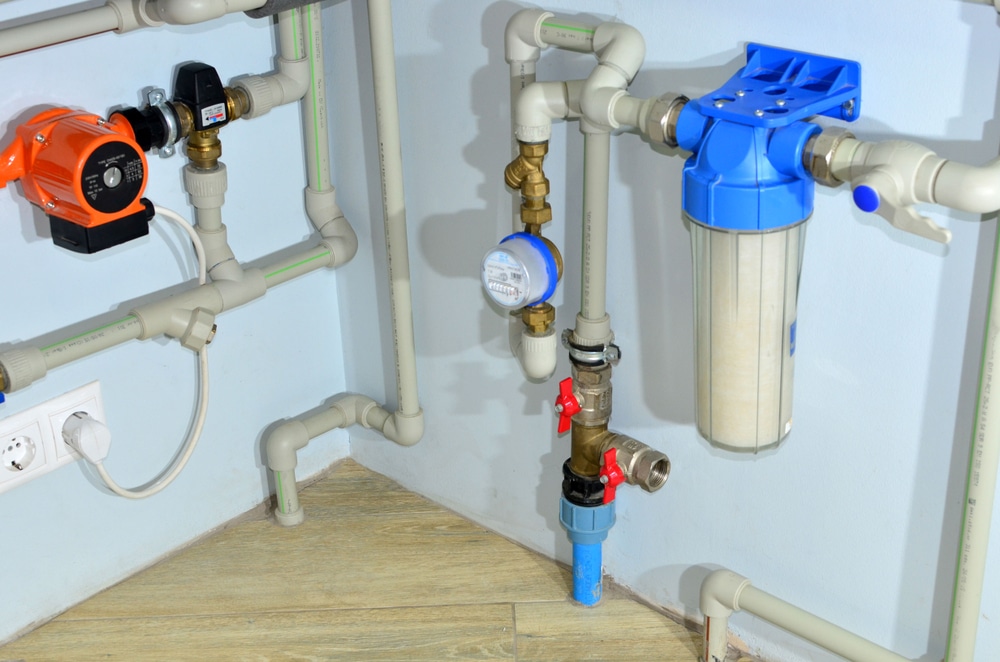
How Do Whole House Water Filters work?
There are different types of whole house water filters and which you use or which combination of them you use will depend on the problems you have with your water. Remember that a main tenet of a whole house water filter system is that its installed at the earliest main point of entry of your water to your house.
In order to get the full benefits to the whole house, you’ll want to place the system as early as possible to getting delivery of your water from the street line or other main access point.
It’s a common practice to see whole house water filters installed in people’s garages. Not only is the point of entry of the water likely routed through the garage in many homes. But, it’s also an ideal place to install and locate the filter system away from the more valuable livable space inside the home.
The systems can be large and often not exactly physically attractive. So, fitting them into a garage, basement, or similar area where space is available, and looks aren’t important is what makes such placement choices so popular.
We also explained earlier that if you have several types of problems with your water , it could be that single system won’t solve all those problems. In these cases, you may have a multi-stage filtering solution that encompasses multiple filter systems. This is another good reason to place such a system in a garage or other area with less valuable living space.
The different types of filter systems are interesting in their range of technologies employed and the problems they address. One very simple solution is a straightforward cartridge that is placed at the point of entry of the water supply and has a filter within its cartridge housing that can block sediment and then deliver clear water to the household.
This simply filtering system is ideal if the only problem you have is sediment in your water and that’s all you need to address.
A similar system is one where you have another cartridge type of filter system, but this time the filter in the housing isn’t just for trapping sediment. This may be a carbon block filter that does additional things to treat your water.
Carbon block filters (activated carbon) are very popular because of their capabilities, such as being able to remove a variety of contaminates such as lead, biological hazards, chlorine, and volatile organic compounds (VOCs). They also filter our sediment, as well, so they’re a great all-around solution.
We talked earlier about the need to not only remove things from the water but also sometimes add things to the water. This is where water conditioners and softeners come into the picture as good choices for the homeowner.
First, we’ll talk about conditions as they’re a bit simpler and play a more limited role. Conditioners act to solve the main problem of the minerals in your water or so-called “hard water” to have less effect in your home.
Conditioners accomplish their treatment by having a material in their housing where your water if forced to go through and as a result it will force the minerals in the water to form crystals. Why this is useful is that the minerals in their new crystal form will not have the same ability to form scale and hard water deposits around your household like on faucets, fixtures, toilets, and bathtubs.
Their effectiveness is limited, however, when we compare them to water softeners and we’ll now explain what softeners do and why it’s more far reaching than what conditioners do.
Water softening systems incorporate a process at their core called ion exchange. This can be explained at a very high level that you have water in a tank that is treated with salt before getting treated and sent inside your home.
What water softeners do is remove the minerals that are part of hard water. Its that hard water that causes scaling on fixtures, make your clothes appear more dingy and stiffer, and forcing you to use more soap for your laundry, or shampoo in the shower.
The conditioning systems alter the minerals so that they don’t do as much scaling. However, the softener system goes further in removing the hardness minerals and you gain the additional advantages of not having minerals in your house water. The benefits are being able to use less soap for laundry, less shampoo in the shower, and clothes will not get as dingy or stiff.
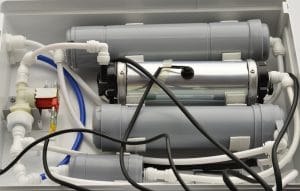
Another water filtering system that we’ll talk about next is the ultraviolet or UV water purifier. These systems are especially important for those that have well water and do not have the benefit of their water supply being disinfected by a municipality.
It can also be a nice backup system for those that have city water because problems can occur to local water sanitation systems and it’s nice to have a UV water purifier as an insurance policy.
What these UV water systems do is very simple is that their only role is to kill or deactivate living organisms that are in the water supply. It does this with the use of a lamp that emits a special wavelength of light that is damaging to living things.
This wavelength is shone on all the water that is forced to go through this UV water filter system and results in all treated water coming out to be free of any harmful biological contaminates such as cysts, bacteria, or viruses.
Let’s discuss one other filter type for a problem that we haven’t yet discussed. Another issue you could have from well water is acidic water. Acidic water is a problem because of the destruction in can cause throughout your house to your plumbing, appliances, and fixtures.
The type of filter system that is used in these situations is a calcite filter. A calcite filter is another whole house water filter that exposes the water coming into the house to a buffering media which contains calcium. This buffering media raises the pH of the water so that it achieves more alkalinity and is safe for your household.
As you saw, there are a variety of different filters that are used as whole house water filters and we explained how some of these systems work. It all beings with identify the exact type of water problems you have and then identify a single or multiple stage solution of water filters that will do everything necessary to treat your water and solve of the problems.
We can’t talk about all the systems under the sun, but we hope this was a good review of how whole house filters work and when you would need certain systems and make the right decision for your household.
Whole House Water Systems Installation & Maintenance
Whole hose water system installation is varied depending on the type of filtering system that you need to use and the overall system that you’re assembling.
At a high level, it’s simple to understand that each type of system has an inlet of where the untreated water is coming into it, the process in between where the unit does its work, and then an outlet where the treated water is sent to household.
Most of the installation is often just making sure you have a clear and organized work space to install or mount the filter or filters you are going to use in your whole house water system and have it be easy to maintain later.
More elaborate systems, like when treating well water supplies that are known to have multiple issues, will be best setup in a big enough space in a garage or similar location.
What is often a great approach is to mountain a large piece of plywood on the wall and then use that as the foundation for the various components to come together as overall neat and easy to build and maintain system.
This video shows you a quality installation of an overall whole house water filter system:
Maintenance is also going to be dependent on exactly what kind of filters you have in your system. If you have a single type of water filter as part of your whole house solution, then it can be very simple.
For example, if you have just a sediment type of filter, the maintenance may be to just empty out the accumulated sediment frequently. Often, these filters have a clear housing that helps you to observe the debris build up and you can determine when you need to remove the built-up debris.
UV filter systems incorporate a UV lamp that will need to be replaced every year. They also use a quartz sleeve that the UV lamp resides within and that needs to be cleaned every year when you replace the UV lamp. You should also replace that sleeve every 2 years to prevent any problems like it breaking due to age.
Calcite filters, water softeners, conditioners, and other systems that incorporate some sort of medium within their process will each have maintenance cycles that you’ll need to pay attention to and refill, replenish, or replace the medium to maintain maximum effectiveness of the filter.
Further Reading:

